#Maurice Blondel
Explore tagged Tumblr posts
Text


Plaque en hommage à : Maurice Blondel
Type : Lieu de naissance
Adresse : 32 rue Chabot Charny, 21000 Dijon, France
Date de pose : Inconnue
Texte : Ici est né le 2-11-1861 le philosophe Maurice Blondel
Quelques précisions : Maurice Blondel (1801-1949) est un philosophe français. Animé par de profondes convictions chrétiennes, il intègre cet élément dans ses travaux philosophiques, y compris dans sa thèse plus connue sous le simple titre de L'Action, qui développe une réflexion sur la place de l’action dans la vie humaine et son lien avec la foi religieuse. De manière générale, son projet philosophique, également présenté dans La Pensée (1934) et La Philosophie et l'esprit chrétien (1946), s'inscrit dans une tentative de réconcilier la foi et la raison, en s'intéressant à la dimension métaphysique des actes accomplis par les êtres humains. Il s'attire toutefois des critiques, tant des milieux catholiques que des universitaires rationalistes.
0 notes
Text
Philosophie et spiritualité
La philosophie moderne se définissant par la raison seule, s’est souvent coupée de la spiritualité. Or, en son origine, la philosophie est exercice spirituel, art de vivre, désir du divin. Au XXes deux figures comme celles de M.Blondel et S.Weil rappellent cette vocation de la philosophie d’unir la pensée et la vie, laquelle s’articule en christianisme à l’exigence de relier raison et foi. A…
youtube
View On WordPress
#Emmanuel Gabellieri#Maurice Blondel#pensée#philosophie#sanctification de la raison#Simone Weil#spiritualité#vie#Vivre#Youtube
0 notes
Text
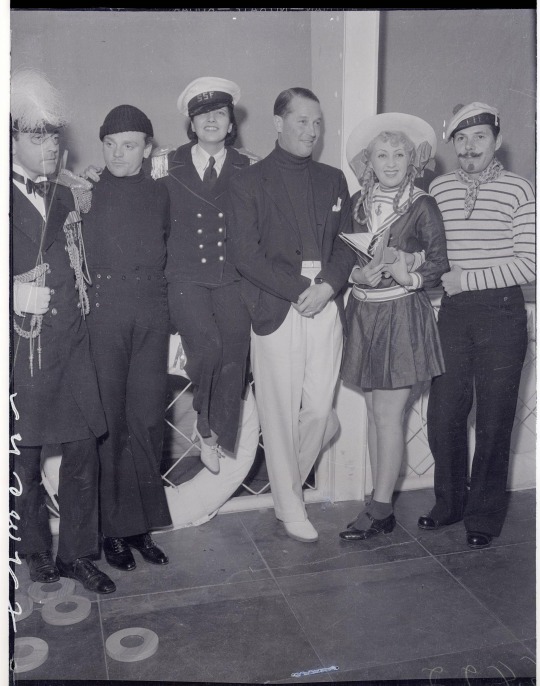
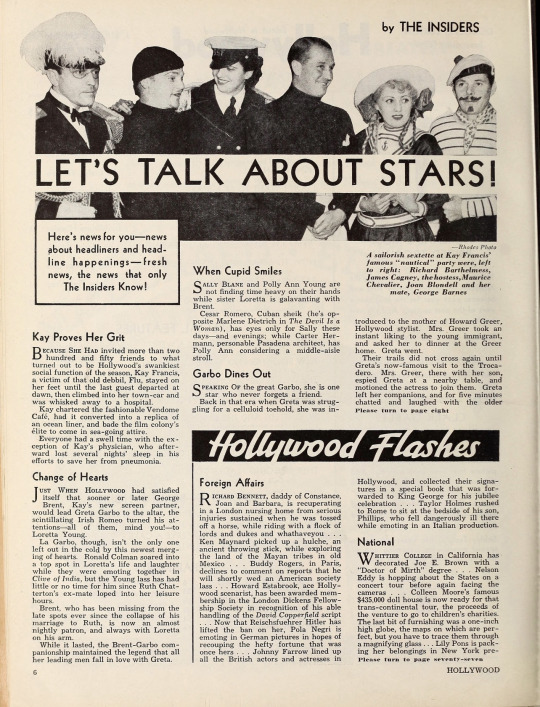
James Cagney, Kay Francis, Maurice Chevalier, Joan Blondell, and George Barnes attending a theme party hosted by Kay Francis herself
“Kay Francis gave a Nautical Night for her friends of cinema-land the other night, and for the occasion converted the Vendome Cafe here, into a "quarterdeck" for dancing and general revelry. And it is recorded in the Daily Press, that, as a result of the party, Miss Francis contracted an attack of influenza, or La Grippe, that compelled her to postpone a trip eastward. Here we see the hostess with some of her guests, in costume. Left to right: Jimmy (James) Cagney; Kay Francis; Maurice Chevalier, Joan Blondell and George Barnes.”
#(at kay’s party)#james cagney#kay francis#joan blondell#maurice chevalier#george barnes#(on mag page)#greta garbo#marlene dietrich#constance bennett#joan crawford#barbara stanwyck#george brent#loretta young#ronald colman#nelson eddy#(other tags)#old hollywood#vintage#vintage magazine#1930s#30s#30s fashion#old films#old movies#30s movies#1930s vintage#1930s style#1930s movies#pre code hollywood
23 notes
·
View notes
Text
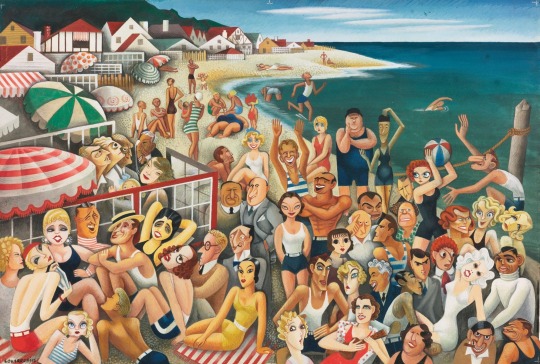
Miguel Covarrubias “Hollywood's Malibu Beach Scene” Source
“Mid-left is John, Ethel and Lionel Barrymore are sitting with George Arliss and Helen Hayes who is holding a baby. Below left are Miriam Hopkins, Lilyan Tashman, Mae West, Edmund Lowe, Constance Bennett, Joel McCrea, Maurice Chevalier, Kay Francis with hands behind her head, Joan Crawford, and Leslie Howard. In the middle, Dolores Del Rio, Adolphe Menjou, Joseph Schenck, Samuel Goldwyn, Joan Blondell, Douglas Fairbanks Jr. with his arms up, Sylvia Sydney, Mary Pickford, Gary Cooper, and Douglas Fairbanks. On the right, Laurel and Hardy, Edward G. Robinson, Cecil B. Demille, Claudette Colbert, Marion Davies, Norma Shearer, Charlie Chapman, Fredric March, Marie Dressler, Gene Fowler, Nancy Carroll holding a beach ball, Howard Hughes, George Raft, Louella Parsons, Harpo Marx, Katharine Hepburn, Jean Harlow, Marlene Dietrich, Schnozzle Durante with his hands up, Greta Garbo, Clark Gable, Ernst Lubitsch, and Wallace Beery.”
11 notes
·
View notes
Text
If at some moments you're uncertain whether what's happening in Opening Night is taking place on-stage or off-, that's the point. Gena Rowlands's Myrtle Gordon is no longer able, in part (but not entirely) because of her alcoholism, to distinguish art from life. This, to me, is John Cassavetes's most accessible film -- which is ironic, since it was a critical and commercial disaster on its initial release in the United States. Cassavetes was unable to find an American distributor for the film, and it didn't get one until two years after his death. Myrtle is struggling through the New Haven tryouts for a play called The Second Woman, which is about the difficulties the character she's playing has with getting older. After one performance, a hyped-up young fan all but assaults her with adoration, but then, as Myrtle's limousine pulls away from the theater, the fan is struck by a car and killed as Myrtle looks back in horror. The fan's death precipitates a breakdown: Myrtle acts up on stage, objecting to a scene in which her co-star and former lover Maurice (Cassavetes) slaps her, arguing with the playwright (Joan Blondell, in a role that was first offered to Bette Davis) that the play's preoccupation with aging is wrong-headed, fighting with her director, Manny (Ben Gazzara), and breaking character on stage during performances. She also begins to see the young woman who was killed, sometimes explaining the vision away as an actress's technique for getting into character, but eventually resorting to consultations with spiritualists. Rowlands is simply phenomenal throughout the film, a performance that must be seen. But Opening Night is overlong at 144 minutes, and it has some of its writer-director's too-loose improvisatory qualities, especially in the scene in which the play finally opens on Broadway and Myrtle and Maurice improvise the final act to the great amusement of the audience, turning the opening night into a hit. In fact, it doesn't seem nearly as hilarious as that audience finds it, and Myrtle's transition from falling-down drunk at the beginning of the opening night performance into quick-witted improviser is hardly convincing. But it's a mistake to try to put any Cassavetes story into a conventional context; he's doing his own thing, and you either appreciate it or you don't. Look for Cassavetes regulars Peter Falk and Seymour Cassel, along with his friend Peter Bogdanovich, in the crowd at the opening night.
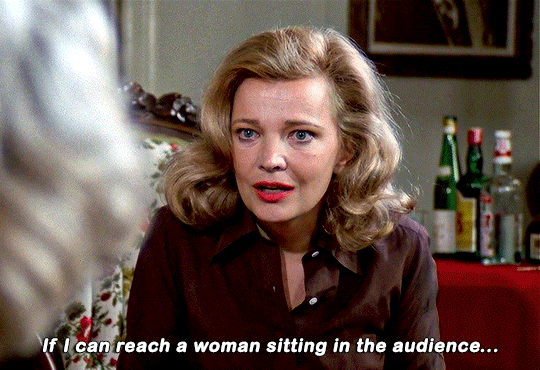
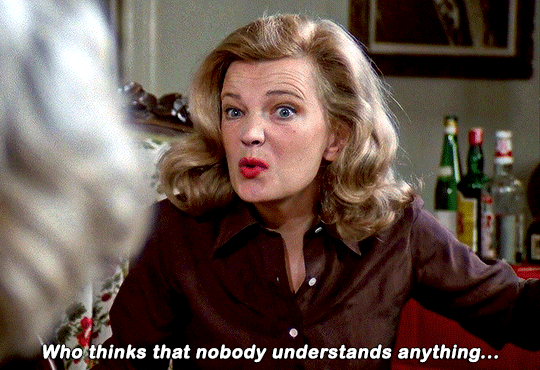
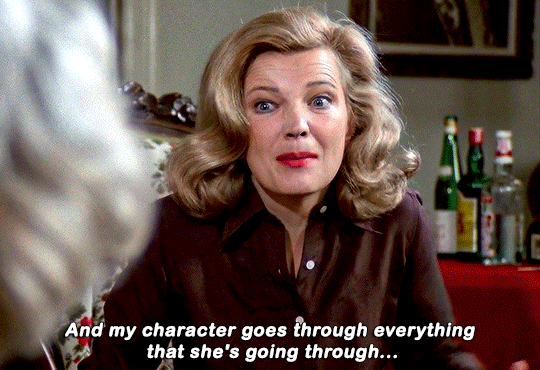
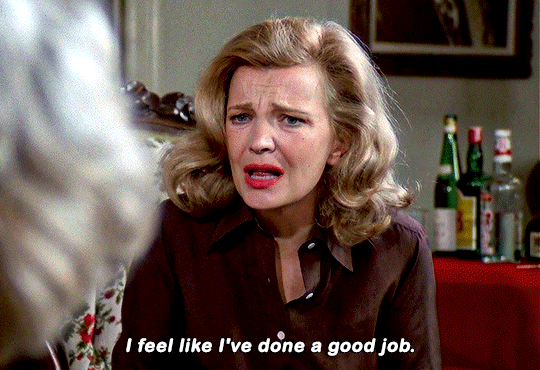
“I'm looking for a way to play this part where age doesn't make any difference. Age isn't interesting. Age is depressing. Age is dull. Age doesn't have anything to do with anything.”
GENA ROWLANDS in OPENING NIGHT 1977, dir. John Cassavetes
2K notes
·
View notes
Text
Novembre MMXXIV "November Who"
Films
Daleks' Invasion Earth : 2150 A.D. (1966) de Gordon Flemyng avec Peter Cushing, Bernard Cribbins, Ray Brooks, Andrew Keir, Roberta Tovey, Jill Curzon et Roger Avon
Family Business (1989) de Sidney Lumet avec Sean Connery, Dustin Hoffman, Matthew Broderick, Rosanna Desoto, Janet Carroll et Victoria Jackson
Le Distrait (1970) de et avec Pierre Richard et Bernard Blier, Marie-Christine Barrault, Maria Pacôme, Catherine Samie, Micheline Luccioni, Paul Préboist, Tsilla Chelton et Robert Dalban
Elvis et Nixon (Elvis and Nixon) (2016) de Liza Johnson avec Michael Shannon, Kevin Spacey, Alex Pettyfer, Johnny Knoxville, Colin Hanks, Evan Peters et Sky Ferreira
Scandale à la cour (Olympia) (1960) de Michael Curtiz et Mario Russo avec Sophia Loren, Maurice Chevalier, John Gavin, Angela Lansbury, Isabel Jeans, Tullio Carminati et Milly Vitale
Monsieur Aznavour (2024) de Grand Corps Malade et Mehdi Idir avec Tahar Rahim, Camille Moutawakil, Gulia Avetisyan, Bastien Bouillon, Marie-Julie Baup, Lionel Cecilio et Hovnatan Avédikian
Les Sentiers de la gloire (Paths of Glory) (1957) de Stanley Kubrick avec Kirk Douglas, George Macready, Ralph Meeker, Timothy Carey, Joe Turkel, Adolphe Menjou et Wayne Morris
L'Alibi (1937) de Pierre Chenal avec Louis Jouvet, Jany Holt, Erich von Stroheim, Albert Préjean, Margo Lion, Fun-Sen, Véra Flory et Génia Vaury
L’Exercice de l’État (2011) de Pierre Schoeller avec Olivier Gourmet, Michel Blanc, Zabou Breitman, Laurent Stocker, Sylvain Deblé, Didier Bezace, Jacques Boudet, François Chattot et Anne Azoulay
Drôle de missionnaire (The Missionary) (1982) de Richard Loncraine avec Michael Palin, Maggie Smith, Phoebe Nicholls, Trevor Howard, Graham Crowden, Denholm Elliott, Michael Hordern et Rosamund Greenwood
Les Félins (1964) de René Clément avec Alain Delon, Jane Fonda, Lola Albright, Sorrell Booke, Carl Studer, André Oumansky, Arthur Howard et George Gaynes
Docteur ? (2019) de Tristan Séguéla avec Michel Blanc, Hakim Jemili, Solène Rigot, Artus, Franck Gastambide, Fadily Camara et Lucia Sanchez
La Séductrice (A Good Woman) (2004) de Mike Barker avec Scarlett Johansson, Helen Hunt, Tom Wilkinson, Mark Umbers, Stephen Campbell Moore, Milena Vukotic et Roger Hammond
Graine de violence (Blackboard Jungle) (1955) de Richard Brooks avec Glenn Ford, Anne Francis, Margaret Hayes, Vic Morrow, Sidney Poitier, Warner Anderson, Louis Calhern, Rafael Campos et Jamie Farr
Peter Gunn, détective spécial (Gunn) (1967) de Blake Edwards avec Craig Stevens, Laura Devon, Edward Asner, Albert Paulsen, Sherry Jackson, Marion Marshall et Helen Traubel
Doctor Who : Le Fandom Français (2019) de Julien Cadart Serizel, Pauline Cadart Serizel et Thomas Pouchin avec Alexandre Blondel, Carine Boxho, Nino Bréant, Mathéo De Lima, Marie Devigne, Romana Doc, Julien Evrard et Antony Fromaget
Séries
Doctor Who Season 20, 1 Series 1, 4, 6, 9, 12, 14
Mawdryn Undead - Father's Day - Terminus - The Doctor's Daughter - The Daleks - Enlightenment - The Curse of the Black Spot - Sleep No More - Praxeus - Rogue - The King's Demons - The Five Doctors
Psych Saison 3, 4, 5
Noël au balcon, tout le monde en prison - Six pieds sous la mer - Sale temps pour Lassiter - Au feu le médium - L'Enfer du vendredi - Plus menteur, tu meurs - Mardi 17, le retour de Jason - Une soirée avec Mr Yang - Mission Canada - Famille, je vous aime - Petits arrangements avec le Diable - Presque cent dollars pour un Shérif - La Peur des balles - Meurtre à Bollywood - À qui le tour ? - La Nuit du Loup-Garou - Y a-t-il quelqu'un pour sauver Shawn ? - En avant soldat ! - Sensations trop fortes - Rendez-vous dans sept ans - Le Groupe de Réflexion - À vos masques… - Dans le ventre de la bête - Mr Yin présente… - La Guerre débridée - La Botte secrète - Soucoupes flippantes - La classe qui tue - À toute vitesse - Un duo vintage - Mer agitée - Alter ego - Partir un jour… - En cabane au Canada
Friends Saison 3, 4, 5
Celui qui avait un tee-shirt trop petit - Celui qui courait deux lièvres - Celui qui avait un poussin - Celui qui s'énervait - Celui qui avait un truc dans le dos - Celui qui voulait être ultime champion - Celui qui allait à la plage - Celui qui soignait les piqûres de méduses - Celui qui ne voyait qu'un chat - Celui qui avait des menottes - Celui qui apprenait à danser - Celui qui avait une nouvelle copine - Celui qui fréquentait une souillon - Celui qui poussait le bouchon - Celui qui était dans la caisse - Celui qui savait faire la fête - Celui qui draguait au large - Celui qui posait une question embarrassante - Celui qui gagnait les paris - Celui qui se gourait du tout au tout - Celui qui n'avait pas le moral - Celui qui jouait au rugby - Celui qui participait à une fête bidon - Celui qui avait la chaîne porno - Celui qui cherche un prénom - Celui qui faisait de grands projets - Celui qui va se marier - Celui qui envoie l'invitation - Celui qui était le pire témoin du monde - Celui qui se marie : première partie - Celui qui se marie : deuxième partie - Celui qui avait dit Rachel - Celui qui embrassait - Celui qui a des triplés - Celui qui accepte l'inacceptable - Celui qui rate son week-end - Celui qui a du mal à se taire - Celui qui emménage - Celui qui avait des souvenirs difficiles à avaler - Celui qui s'était fait piquer son sandwich - Celui qui avait une sœur un peu spéciale
Astrid, Raphaëlle et Alexandre Ehle
Œil pour Œil
Dans l'ombre
50,47 % - Le chat noir - La riposte - Élu par la foudre - Danse sur un volcan - L'odeur de l'essence
Opération Trafics
Procédure exceptionnelle - Drôle de pastis - La Bataille de l'or - La Sainte Famille - W… comme Watteau - T.I.R
Astrid et Raphaëlle Saison 1
Puzzle - Hantise 1 - Hantise 2 - Chaînon manquant - Chambre close - Fulcanelli - L'Homme qui n'existait pas - La Mort et Compagnie - Invisible
Les enquêtes Caméléon
Trou de mémoire - Un panier de crabes - Les Gens d'en face
Cat's Eyes Saison 1
Tamara - Sylia - Alexia - Quentin - Gwen - Prudence
Les Enquêtes de Vera Saison 13
Délit de fuite
Spectacles
Portishead : Roseland NYC Live (1998)
Tant qu'il y a de l'amour (2019) de Bob Martet avec Marie-Anne Chazel, Patrick Chesnais, Valérie Bègue et Laurent Gamelon
Play the Blues: Live from Jazz at Lincoln Center, Wynton Marsalis and Eric Clapton (2011)
Charles Aznavour : Au Carnegie Hall (1995)
Charles Aznavour : Symphonique au Théâtre du Chatelet (1981)
Mascarin (1973) de et avec Michel de Ré et Micheline Dax, Alain Lionel, Arlette Didier, Francis Lax, Jean Péméja et Virginie Vignon
U2: Rattle and Hum (1988)
Amy Winehouse: Live at Porchester Hall (2007)
Doctor Who at the Proms (2013) avec Neve McIntosh, Dan Starkey, Matt Smith, Jenna Coleman, Carole Ann Ford, Peter Davison, Nicholas Briggs, Ben Foster et Murray Gold
Grand Concert de la fête de la Sainte Cécile (2024) par l'orchestre d'harmonie d'Albi et l'orchestre cadet de la fédération du Tarn
Santana: Supernatural Live (2000)
Nina (1979) de Jean Laurent Cochet avec Jacques Sereys, Louis Velle, Rosy Varte, Yves Marchand et Gérard Pollet
Livres
Doctor Who : Il était une fois un Seigneur du Temps de Dan Slott, Christopher Jones, Matthew Dow Smith, Mike Collins et David Guelou
Les contes de l'infini de Flavia Valerio, Pauline Cadart Serizel, Rémi Germain, Marion Lemaître, Manon Segur, Robin Brou, Julien Cadart Serizel et Marie Valerio
Doctor Who : Le douzième docteur, tome 2 : Fractures de Robbie Morrison, Brian Williamson et Mariano Laclaustra
Doctor Who : L'Armée oubliée de Brian Minchin
Les Daleks envahissent la terre de Terrance Dicks
0 notes
Text

James Cagney, Kay Francis, Maurice Chevalier Joan Blondell at a Hollywood costume party 1935
0 notes
Text
0 notes
Text
Unable to find her runaway son, a woman deceives two of her ex-lovers from her youth, a mild-mannered teacher and a tough journalist, that each is the real father in order to obtain their help. Credits: TheMovieDb. Film Cast: François Pignon: Pierre Richard Jean Lucas: Gérard Depardieu Christine Martin: Anny Duperey Paul Martin: Michel Aumont Tristan Martin: Stéphane Bierry Milan: Philippe Khorsand Ralph: Jean-Jacques Scheffer Jeannot: Roland Blanche Verdier: Jacques Frantz Raffart: Maurice Barrier Mrs. Raffart: Charlotte Maury-Sentier Louise: Gisèle Pascal Stéphane: Patrick Blondel Michèle Raffart: Florence Moreau Patron of “Star Trek”: Patrice Melennec Hotel Receptionist: Robert Dalban Internal: François Bernheim …: Bruno Allain Man in garage blocked by car: Philippe Brigaud …: Pulcher Castan …: Luc-Antoine Diquéro Journalist who flirts with Lucas: Natacha Guinaudeau …: Sonia Laroze Thug: Patrick Laurent …: Jean-Claude Martin …: Guy Matchoro Julien: Jacques Maury Toilet attendant: Jacqueline Noëlle …: Christian Bianchi …: Gérard Camp …: Patrick Le Barz …: Philippe Ribes …: Claude Rossignol Michelle (uncredited): Florence Mancini Film Crew: Original Music Composer: Vladimir Cosma Producer: Francis Veber Director of Photography: Claude Agostini Editor: Marie-Sophie Dubus Producer: Pierre Richard Costume Design: Corinne Jorry Production Design: Gérard Daoudal Assistant Director: Francis de Gueltzl Casting: Françoise Menidrey Sound: Bernard Aubouy Producer: Gérard Depardieu Production Manager: Jean-Claude Bourlat Script Supervisor: Colette Crochot Boom Operator: Sophie Chiabaut Electrician: Richard Vidal Makeup Artist: Thi-Loan Nguyen Stunt Coordinator: Guy Di Rigo Location Manager: Jean-Yves Asselin Stunt Coordinator: Antoine Baud First Assistant Camera: François Amado Movie Reviews:
0 notes
Text
MAURICE BLONDEL: ON THE REASON AND ESSENCE OF HUMAN ACTION
One of my college professors used to say that philosophers should be happy to embrace the assessment coming from some detractors who claim that, “philosophy talks about the obvious.” What do we mean by ‘obvious,’ if not what is always in front of us and stares us in the face? And what need would we have for a discipline that retells what seems to be in no need of retelling, precisely, the obvious To Know more visit our website https://www.stbernards.edu/blog/maurice-blondel
0 notes
Text
If Christianity claims to satisfy man's natural needs, it also claims to arouse and fulfil new ones, far beyond anything which we could hope for or suspect, and that the need for the gift, the request for the gift is, like the gift itself, already a grace. Maurice Blondel
0 notes
Text
Le projet révolutionnaire du mondialisme anglo-américain
Le mondialisme anglo-américain porte un projet révolutionnaire qui est rejeté par les peuples qui ont souffert de la domination communiste. On ne peut pas comprendre ce projet si on ne comprend pas le but réel du christianisme.
Le gnosticisme affirme que la perfection est au commencement puis qu’à la suite d’un drame, d’une chute, la création s’est déréglée. Le but du Christ pour les gnostiques chrétiens c’est de revenir à la perfection originelle, au jardin d’Éden. Face à ce christianisme inspiré par le platonisme, le néoplatonisme ou la gnose se dresse le véritable christianisme qui affirme, avec tous les prophètes hébreux, avec le Christ, avec Jean l’évangéliste, avec Paul l’apôtre des Gentils, avec Irénée de Lyon, avec Jean Duns Scot, avec Maurice Blondel, avec Claude Tresmontant, que la perfection n’est pas au commencement mais à la fin, dans l’union de Dieu et de la créature humaine. Même le Christ, pourtant uni dès sa conception au Parler, n’est pas né parfait comme le répète l’épître aux Hébreux, comme le prouvent ses trois tentations au désert, comme le montre, juste avant sa passion, sa prière au jardin du pressoir à huiles (gan gath schemanim en hébreu).
Le véritable but du Christ n’est pas de réparer l’humanité abîmée par le péché originel. L’homme est sur terre, enseigne le Christ, pour rejeter les programmations animales inscrites dans la nature humaine, dans ce que les scientifiques appellent le cerveau reptilien et le livre de la Genèse le serpent tentateur, afin de recevoir librement, d’assimiler et de pratiquer avec l’aide du Père Éternel les programmations que l’Esprit qui est en Jésus propose à l’homme afin de l’élever à Dieu, d’en faire « un dieu, un fils du Très-Haut » (Psaumes 81,6). Et donc le Christ rejette la société humaine traditionnelle, issue des programmations animales que ha-adam (ça veut dire l’homme en hébreu) a reçues dans son esprit lors du péché originel. Le péché originel est une religion, une certitude de l’esprit humain en la chair, en la nature humaine. Il se transmet comme toute religion par l’éducation, par la famille, par la société.
Une fois comprise la finalité du christianisme nous pouvons comprendre la nature du mondialisme anglo-américain. Comme toute tradition humaine, comme la Russie de Poutine, comme l’Inde païenne, comme la Chine communiste, le mondialisme anglo-américain est l’héritier du péché originel, de la certitude (de la foi comme disent les curés) en la nature humaine. Mais le mondialisme anglo-américain est plus avancé dans le mal que toute autre tradition humaine. C’est lui le satan, le régisseur du mal. Et que fait le satan ? Il singe Dieu. Et puisque Dieu s’oppose par la bouche de son Fils aux structures traditionnelles de l’humanité animale que sont la famille, le clan, la tribu, la nation, l’ethnie, la race, le satan aussi s’y oppose. Mais là où le christianisme remplace la famille animale par cette famille chrétienne qu’est l’Église (Mt 12,46-50 ; Marc 3,32-35 ; Luc 8,19-21), le mondialisme anglo-américain ne peut que proposer des structures dérivées de l’humanité animale mais huit fois plus perverses et criminelles que les structures traditionnelles : le réseau pédophile, le groupe mafieux, la fraternité nazie, le gang de narcotrafiquants qui pratique la torture et l’extermination, la horde ukrobandériste adepte de l’épuration ethnique, la secte messianiste juive antinomiste pratiquant la rédemption par le mal, les groupuscules de mercenaires du djihadisme, la société secrète athée, pédéraste et anarchiste, et ainsi de suite.
C’est ainsi qu’il faut comprendre l’affrontement entre Poutine qui d’une certaine manière appartient à la tradition animale traditionnelle, mauvaise et rejetée par le Christ, et Bidhaine, Gaylysée, Vonder la Hyène, possédés par une haine du Christ à l’origine de leur rechute dans le paganisme. C’est là que réside l’un des paradoxes les plus étonnants de notre époque : ceux qui sont les héritiers d’une longue tradition athée comme Poutine ou Xi Jinping, sont souvent moins mauvais que ceux qui, comme Bidhaine, Vonder la Hyène, Gaylysée et sa mouquère, ont rejeté le Christ. Les premiers sont pour ainsi dire presque revenus à l’antique tradition humaine animale, les seconds sont, comme l’enseigne le Christ lui-même, huit fois plus mauvais que l’humanité traditionnelle :
Mt 12,43-45
43 lorsque l’esprit impur est sorti de l’homme il parcourt les lieux arides et il cherche un endroit pour se reposer et il ne le trouve pas
44 alors il se dit
dans ma maison je vais retourner celle dont je suis sorti
et il arrive et il la trouve inoccupée balayée et arrangée
45 alors il y va et il prend avec lui sept autres esprits encore plus mauvais que lui ils y entrent et ils y habitent et elle est la condition ultérieure de cet homme pire que sa condition première
ainsi il en sera aussi pour cette génération mauvaise
0 notes
Text
Les soleils froids de la conscience, et la chaleur de ses abysses
Les soleils froids de la conscience, et la chaleur de ses abysses
–Saint Augustin– La conscience et l’inconscient sont des notions relatives, entremêlées. Il y a des états de conscience qui sont en réalité dominés par l’inconscient, et d’autres où la conscience l’emporte sur lui. On ne peut jamais être certain d’appréhender la véritable nature des contenus de la conscience, leur sens le plus profond, leurs implications possibles, et le réseau de leurs…

View On WordPress
#C.G. Jung#Husserl#Inconscient#Jean-Paul Sartre#Maurice Blondel#Maurice Merleau-Ponty#Saint Augustin
1 note
·
View note
Photo

GOD IN THE NITTY-GRITTY OF LIFE
According to Michael Valpy of Globe and Mail, at the core of Gregory Baum’s theological convictions "lay the writings of the early-20th-century French philosopher Maurice Blondel. They led to what may have been his most important book, Man Becoming: God in Secular Language, assessing positively Blondel's acknowledgment of God's redemptive presence in human history.
God, in other words, existed in the nitty-gritty of life - an "insider God," as Toronto's Regis College academic Mary Jo Leddy explained Dr. Baum's view. You fall in love?
That's God at work.
God was on the ground with grace - the benevolence shown by God toward the human race, the spontaneous gift from God to people, "generous, free and totally unexpected and undeserved."
3 notes
·
View notes
Quote
Real history is composed of human lives; and human life is metaphysics in act . . . In default of an explicit philosophy, a man ordinarily has an unconscious one.
Maurice Blondel
1 note
·
View note
Photo

I novatores e il grosso guaio del primato del come sul cosa Nella dottrina della Chiesa il cosa ha sempre avuto il primato sul come. I contenuti delle verità rivelate hanno sempre avuto il primo piano rispetto a come vengono conosciute e a come vengono espresse.
#Apostasia#apostati#Arturo Sosa#cattivi maestri#cattolici adulterati#Dominique Chenu#Eresie#eretici#falsi profeti#fumo di satana#gesuiti#idiozie clericali#Karl Rahner#Maurice Blondel#modernismo#neomodernismo#nouvelle theologie#novatores#progressismo#spirito del concilio#walter kasper
0 notes